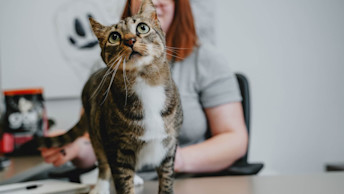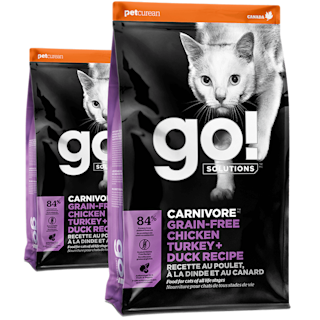July 15, 2022
What to Do If My Cat Has Pancreatitis?

What is pancreatitis?
Pancreatitis is inflammation of the pancreas. This occurs when the inactive enzymes that are released by the pancreas become prematurely activated before reaching to the small intestine. Then, the enzymes will start “digesting” the pancreas itself, which leads to inflammation.
The exact cause of pancreatitis is not fully understood. Pancreatitis has been reported to appear spontaneously, but also as a secondary condition to underlying diseases such as diabetes or inflammatory bowel diseases.2 In addition, presence of infectious agents such as feline herpes virus and toxoplasma, have been linked to the development of pancreatitis in cats.2
What does the pancreas in cats do?
The pancreas is a digestive gland that is located close to the stomach.
The main role of pancreas is to release digestive enzymes to the small intestine to help in the digestion of food.
Enzymes that the pancreas secretes are lipase, amylase, and protease to break down fats, carbohydrates, and protein, respectively. Insulin is a hormone that controls the blood sugar level and is secreted by the pancreas as well. Thus, the pancreas plays a vital role in the digestion process and blood glucose control, and it is important to keep it working well.
How serious is pancreatitis?
Pancreatitis is a serious condition that often co-exists with other diseases such as inflammatory bowel disease and can trigger the onset of hepatic lipidosis or fatty liver.1Moreover, if your cat is diabetic, pancreatitis can further complicate the condition. Thus, pancreatitis can also be life threatening. Pancreatitis has been found to be a recurring condition in cats, this is then known as chronic pancreatitis.
Symptoms of pancreatitis in cats?
In cats, pancreatitis is not specific to a certain age, breed, sex, or body condition score.1 However, obese cats are more prone to diabetes and pancreatic complications.
The clinical signs of pancreatitis in cats are considered subtle or nonspecific.
Thus, a thorough veterinary examination is needed if you notice some of these symptoms or signs of pancreatitis:
- Lethargy
- Decreased appetite
- Diarrhea
- Dehydration
- Vomiting
- Abdominal pain
What can you do?
If you have cats with pancreatitis, it is important to choose the right food for them, it can be tricky and might require trial and errors, but do not fret! Our nutrition team at Go! Solutions is here to help you make the right food choice for your cats!
We do have some dietary and nutritional recommendations for cats with pancreatitis:
Reduced carbohydrate and higher protein diets
Unlike dogs, fat intake restriction in cats with pancreatitis is unnecessary.2 High fat foods have not been shown to cause or exacerbate pancreatitis in cats. However, some veterinarians might suggest that high fat diets are to be avoided.
Since pancreatitis is often associated with diabetes, a reduced carbohydrate diet might be a great option for your cats. The pancreas is responsible for the release of insulin and if the pancreas is inflamed and not working properly, the release of insulin might be affected. A reduced carbohydrate diet may be recommended to help manage blood glucose levels.
Our Go! Solutions Carnivore recipes for cats, particularly the Go! Solutions Carnivore Grain-Free Chicken, Turkey + Duck Recipe is a high protein and low carbohydrate diet that may be an option suitable for cats with pancreatitis with concurrent diabetes.

Recommended Solution
Protein-rich recipe for meat loving cats
This delicious grain-free, protein-rich Go! Solutions Carnivore recipe has been specially formulated to support strong, lean muscles in meat-loving cats.
View product details
Novel or hydrolyzed protein recipe
Our Go! Solutions Sensitivities recipes for cats may be options for cats that have pancreatitis along side inflammatory bowel disease. Food allergies or sensitivities to certain protein ingredients in the diet have been reported to be one of the causes of inflammatory bowel disease in cats.3 Thus, our Go! Solutions Sensitivities line can help to address this because our recipes are made with limited ingredients and single source of novel high-quality protein such as duck.
Conclusion
Pancreatitis is a serious disease that needs to be addressed. If your cat has been diagnosed with pancreatitis, it is important to choose a suitable diet that Some dietary options have been mentioned here but we also strongly recommend that you discuss with your veterinarian to find the best option for your cats.
References:
Armstrong, P.J. and Williams, D.A., 2012. Pancreatitis in cats. Topics in companion animal medicine, 27(3), pp.140-147.
Jensen, K.B. and Chan, D.L., 2014. Nutritional management of acute pancreatitis in dogs and cats. Journal of veterinary emergency and critical care, 24(3), pp.240-250.
https://vcacanada.com/know-your-pet/inflammatory-bowel-disease-in-cats



